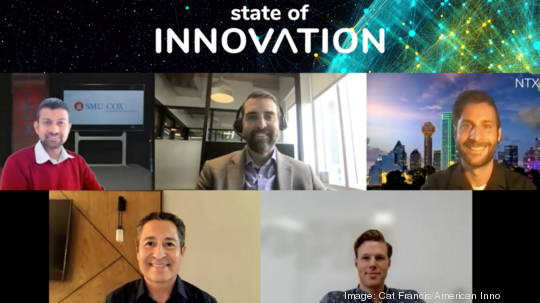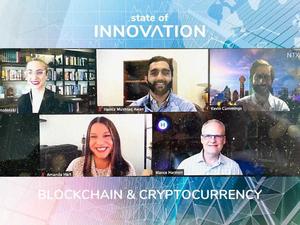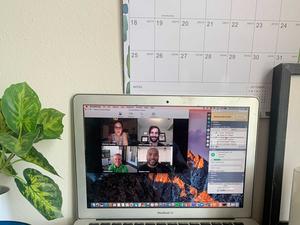
From factory closures to inventory shortages and material price fluctuation, the pandemic has affected the supply chains of nearly every company, big and small, across the globe.
On Tuesday, NTX Inno sat down with Jorge Corral, Dallas office managing director and South MU supply chain lead at Accenture; Gabe Deale, president and COO at Fort Worth delivery startup Gozova; and Stephen Ellsworth, CEO at beverage brand Poppi for a panel discussion hosted by Associate Professor and Corrigan Research Professorship at SMU’s Cox School of Business Sreekumar Bhaskaran. At the event, the local leaders talked about the disruptions they’ve encountered, changes they’ve made along the way and what they have their eyes on in the future.
“Two big things that we've seen over the last 18 months with companies are pivoting fundamentally to new ways of working, and those have talent, labor process and different impacts on businesses,” Corral said at the event. “The second one is figuring out how to address what we call resilience in their supply chain, so that… when there is a disruption, how do (companies) address it and how do they respond to make sure they stay relevant.”
Pro tip: If you missed out on the live event, check out the recording below.
Whether panelists attributed disruptions to delays, changes in consumer behavior or the rise in on-demand delivery, each one said they had been affected by supply chain issues during the pandemic. For companies like Poppi, that meant creating tighter relationships with suppliers. For others like Gozova, that meant prioritizing core services, focusing on customer deliveries more than a flexible warehousing vertical the company is expanding into that saw rising costs in metals and lumber.
“The only constant is change. You can't ever over-leverage yourself on one particular focus, where it doesn't allow you to kind of take advantage of other opportunities as they come along and divest from something that maybe isn't working quite as well,” Ellsworth said at the event. “It’s flexible to take the punches as they come.”
One tool that all panelists mentioned as an aid to their navigation of the pandemic was technology, whether that meant converting to the cloud to become more flexible, using data to communicate real-time needs and information to communicate with suppliers and clients, or incorporating AI tools that allow business processes to be streamlined and outcomes to become more accurate and uniform.
“The more you can leverage technology to minimize the number of people that you need to manage those processes, the better and the more consistent the output and the more human error that you minimize,” Deale said at the event.
Overall, Corral said the focus of companies over the past two decades, when it comes to looking at supply chain volatility, has been on short-term risk mitigation plans. However, as they look ahead, digitized communication and predictive insights will be required to navigate and quickly pivot during future spikes in disruption.
The panelist ended with their thoughts on the future of the supply chain (responses have been edited for clarity and brevity).
Deale: I would say be the change that you seek. You are the innovators of tomorrow to take advantage of the new advancements in technology, challenge yourselves to think differently. Don't look at the market as it is today. Look at it as you think it should be. So, when you set out to solve some of these challenges, don't be confined by any of the constructs that you've seen so far. Dare to rethink it. That's been something that we've looked at constantly. When we start to think there's only one way to overcome an obstacle and you kind of get stuck in this construct of thinking, it's important to challenge that box that you've put yourself in. The truth is, there are all kinds of really cool new tools, innovations. We had a moment where we were trying to figure out when would be a great time to build a reporting engine. Then, we were like, ‘Why would we build a reporting engine when we could just buy a business intelligence tool that has direct access to our database, suck the information in, and then we get all kinds of insight from multiple disparate sources?’ It's that kind of stuff. Don't limit your thought process. Get out there, challenge these norms and shake up the world.
Ellsworth: With all of the information that's at our hands, humans are resilient at the end of the day. We've been through so many things, and humans will continue to be resilient, innovative, and be disruptive. Regardless of whatever current situation we're in, we'll continue to be resilient, push on and make sure that with all of the information that we have, that we're making fact-based decisions and not fear-based decisions. Informing ourselves and just knowing that we can overcome the challenges that are placed before us, it's in our nature to continue to be progressive and find solutions to the problems at hand.
Corral: Most companies need to think long-term about making a resilient supply chain because of these disruptions that we just saw. There's only going to be more of them. There are going to be different flavors of it. Things will continue to be volatile, but we don't know when it's going to happen. So, think end-to-end, from the supplier through your customer and everything in between. Apply some stress tests where you work and design them in advance because these disruptions will continue.
Bhaskaran: The relevancy, the resiliency and the responsibility of the supply chains are important. It will take a whole lot of different things for us to be able to achieve that. It's about managing disruptions. It's about managing balance. It's about managing processes and being able to kind of put it all together. The future is great, so long as we can shape it. It's going to become what we are going to make it out to be.
You can hear the conversation in their own words, and check out the recording below.
And of course, we’d like to thank our founding partners UT Dallas and Thomson Reuters, as well as our event sponsor Accenture, for making this State of Innovation event possible.







